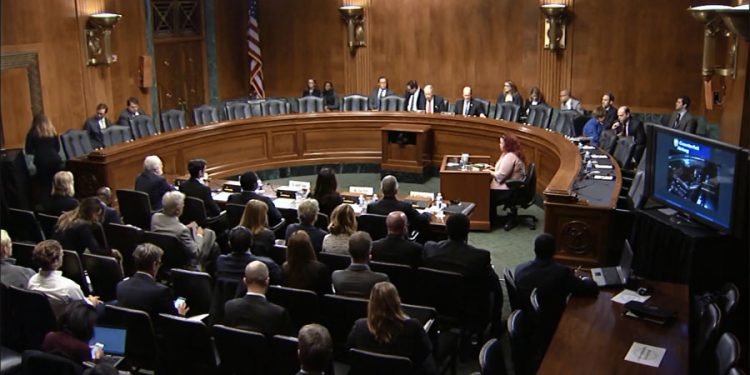Currently, the Democrats hold a slim 51-49 majority in the U.S. Senate. However, the upcoming 2024 elections present a favorable scenario for Republicans, as Democrats are tasked with defending 23 out of the 34 seats in contention. Notably, three of these seats are in states that leaned towards Trump in 2020—West Virginia, Montana, and Ohio.
Adding to the challenge for Democrats, five other seats in their possession are situated in crucial swing states that President Biden narrowly won in 2020—Arizona, Michigan, Nevada, Pennsylvania, and Wisconsin. Despite these hurdles, the Democratic Senatorial Campaign Committee remains optimistic, asserting that they have multiple strategies to fortify their Senate majority.
In response to Senator Joe Manchin’s announcement, David Bergstein, a spokesperson for the Democratic Senatorial Campaign Committee, emphasized the party’s strong position to defend incumbents and expand their battleground to include states like Texas and Florida, where they target what they describe as “unpopular Republican incumbents.” Notably, the races in Texas and Florida, with incumbents Ted Cruz and Rick Scott seeking re-election, seem to be the primary competitive GOP-held seats.
As the 2024 elections loom, a closer examination reveals the top five Senate seats most susceptible to flipping.
West Virginia
Manchin’s decision not to run for re-election has prompted optimism from National Republican Senatorial Committee (NRSC) chairman Sen. Steve Daines, who expressed confidence, stating, “We favor our chances in West Virginia.” The primary focus currently lies in the Republican Senate primary, where the NRSC and Trump support the well-regarded Democrat-turned-Republican Governor Jim Justice.
Following Manchin’s exit, the first Democrat to enter the race is Zachary Shrewsbury, a 32-year-old West Virginia native and Marine Corps veteran.
Montana
Democrats found reassurance with Senator Jon Tester’s decision to run for re-election in Montana in 2024, a state where Trump secured a 16-point lead three years ago. Despite the challenging landscape, Tester, the Democratic incumbent, has amassed an impressive $15 million in fundraising this year.
In contrast, Tim Sheehy, a former Navy SEAL and Purple Heart recipient with over 200 missions in global conflicts, entered the Republican Senate race in late June. Backed by the NRSC, Sheehy serves as the CEO of Bridger Aerospace, a Montana-based company specializing in aerial firefighting and wildfire surveillance.
Adding to the mix, Rep. Matt Rosendale, a staunch conservative, is actively considering a Senate bid. Rosendale, who narrowly lost to Tester in the 2018 election, remains a notable contender in the unfolding political landscape.
Ohio
Democratic stalwart Senator Sherrod Brown stands as the sole party member to secure a non-judicial, statewide victory in Ohio over the past decade. As he seeks a fourth consecutive six-year term in 2024, Brown becomes a prime target for Republicans in a state that has shifted towards the red spectrum over the last six years.
With Trump carrying Ohio by eight points in both his 2016 triumph and 2020 re-election bid, the state, once a pivotal general election battleground, has witnessed a notable conservative shift. In the previous year, Senator JD Vance, handpicked by Trump as the Senate candidate in Ohio, triumphed over Democratic stalwart Rep. Tim Ryan by six points, despite Ryan running what political experts deemed a nearly flawless campaign.
Brown, a seasoned political figure with roles as a congressman, state lawmaker, and Ohio secretary of state over nearly half a century, enjoys widespread recognition throughout the Buckeye State. Renowned for championing populist causes, he amassed $3.6 million in contributions in the first three months of the current year.
Already in the race to challenge Brown are two Republicans who vied unsuccessfully for the 2022 GOP Senate nomination in Ohio. State Senator Matt Dolan, a former prominent county prosecutor and Ohio assistant attorney general, initiated his campaign in January. Dolan, whose family owns the Cleveland Guardians in Major League Baseball, invested millions of personal funds in ads for his 2022 Senate bid.
In April, Bernie Moreno, a prosperous Cleveland-based businessman and luxury auto dealership magnate, entered the fray. An immigrant who legally arrived in the U.S. from Colombia at the age of five, Moreno also committed substantial personal funds to television commercials in his inaugural Senate campaign.
Arizona
As Senator Kyrsten Sinema, now an independent, seemingly prepares for a re-election bid, though not officially declared, the 2024 Senate race in pivotal Arizona takes on a notably intricate dynamic. Democratic Representative Ruben Gallego has already entered the fray from the left, surpassing Sinema in fundraising, albeit the incumbent maintains a substantial cash-on-hand advantage.
Pinal County Sheriff Mark Lamb has emerged as a significant GOP contender, launching his campaign recently. However, the entrance of Kari Lake, the 2022 GOP gubernatorial nominee and former TV news anchor with strong ties to Trump, swiftly positioned her as the Republican frontrunner upon joining the race in October. Despite a narrow loss in the previous year’s gubernatorial election, Lake, unwavering, declined to concede.
Pennsylvania
The perennial battleground of the Keystone State is poised to live up to its reputation in 2024, hosting what is anticipated to be one of the nation’s most fiercely contested and expensive Senate races.
Democratic Senator Bob Casey, with a decade-long tenure as the state’s auditor general and treasurer before entering the Senate in 2006, is actively pursuing a fourth six-year term. Expected to face minimal competition in the Democratic primary, Casey is the son of a well-regarded former governor.
Republicans are coalescing around Dave McCormick, marking his second consecutive Senate run. Endorsed by the Pennsylvania GOP in late September, McCormick, a former hedge fund executive, West Point graduate, Gulf War combat veteran, and Treasury Department official in the George W. Bush administration, is positioned as a unified choice for the party.
 Telegram is where we really talk. Don't miss out!
Telegram is where we really talk. Don't miss out!







